 “If you wish to light both your inside and outside, place the jewel-decorated lamp of Shri Rama’s holy name at the doorway of your mouth, says Tulsi.” (Dohavali, 6) “If you wish to light both your inside and outside, place the jewel-decorated lamp of Shri Rama’s holy name at the doorway of your mouth, says Tulsi.” (Dohavali, 6)rāma nāma manīdīpa dharu jīha deharī dvāra | tulasī bhītara bāharehum̐ jauṃ cāhasi ujiyāra || It’s a dark night. You’ve been on the road for a long time, and you’re looking for a place to provide some comfort, protection and relief from the distresses of your journey. It’s late at night, so visibility is not so good. You pass by many houses, but the glaring indication of an inviting abode, the sign you are looking for, is the lamp burning outside the home. This light can come in the form of a street light or a nice set of candles. Indeed, one who keeps a lamp studded with many jewels, or manidipa, at their doorstep signals that their home is a refuge for anyone seeking it. The light in the front not only burns brightly on the outside, but it shows that there is a light shining inside of the home as well, where warmth, succor, food, drink and shelter can be found. The lit lamp outside the home serves as an open invitation for stranger and friend alike to come and be greeted with a smiling face. In a similar manner, one who chants the holy name of Shri Rama, keeping the non-different expansion of the Supreme Spirit on the tip of their tongue, lights up both their outside and inside. The tongue, as the instrument for speech, serves as the gateway to the soul, allowing for an individual’s character, nature, demeanor, and most importantly, consciousness, to be observed, studied and relished by others. Anyone who regularly chants the Lord’s name will keep both their inside and outside fully lit with transcendental bliss. 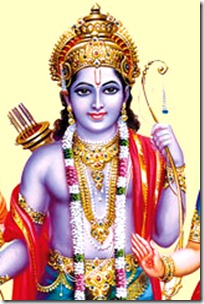 Why is chanting the holy name so important? Aren’t there other ways to decipher a person’s consciousness? Can’t we look at their face and tell what their mood is? According to the Vedic authorities, those who spend time in samadhi, or divine trance, contemplating and understanding the highest truths of life passed down by their predecessors, the name of the Supreme Spirit is the most powerful incarnation, especially in this age. Though there is a wide variety of opinion on theology - with some believing that man invented God to cope with the realization of his impending death, and others sternly chastising those who don’t accept the benevolence of a particular savior - the Vedic opinion, one which is based on the authority of Lord Krishna, the Supreme Personality of Godhead, is that the properties of spirit and their relationship to a higher power never change. Rather, the soul remains eternally blissful and knowledgeable, though when placed in a temporary covering composed of inhibiting elements, remembrance of the intrinsic properties gets temporarily lost. This ignorance then leads to a complete forgetfulness of the relationship with the more powerful spiritual entity, the Supersoul, the direct manifestation of God residing within the heart. Not only is the relationship to God always ready to be reestablished, but it is the only link that allows the natural desire to love and provide service to be fully acted upon. God’s true position, His feature that brings Him universal appeal and worthiness of being worshiped, is that of best friend to all life forms. Our friends are those with whom we voluntarily engage in sportive pastimes and talks. In this respect the relationship with the Lord is no different, as there are various rasas, or transcendental mellows, that provide pleasure to the liking of the individual. Why is chanting the holy name so important? Aren’t there other ways to decipher a person’s consciousness? Can’t we look at their face and tell what their mood is? According to the Vedic authorities, those who spend time in samadhi, or divine trance, contemplating and understanding the highest truths of life passed down by their predecessors, the name of the Supreme Spirit is the most powerful incarnation, especially in this age. Though there is a wide variety of opinion on theology - with some believing that man invented God to cope with the realization of his impending death, and others sternly chastising those who don’t accept the benevolence of a particular savior - the Vedic opinion, one which is based on the authority of Lord Krishna, the Supreme Personality of Godhead, is that the properties of spirit and their relationship to a higher power never change. Rather, the soul remains eternally blissful and knowledgeable, though when placed in a temporary covering composed of inhibiting elements, remembrance of the intrinsic properties gets temporarily lost. This ignorance then leads to a complete forgetfulness of the relationship with the more powerful spiritual entity, the Supersoul, the direct manifestation of God residing within the heart. Not only is the relationship to God always ready to be reestablished, but it is the only link that allows the natural desire to love and provide service to be fully acted upon. God’s true position, His feature that brings Him universal appeal and worthiness of being worshiped, is that of best friend to all life forms. Our friends are those with whom we voluntarily engage in sportive pastimes and talks. In this respect the relationship with the Lord is no different, as there are various rasas, or transcendental mellows, that provide pleasure to the liking of the individual.Yet due to the ignorance enveloping the phenomenal world, the land where material elements cloud the natural torchlight of knowledge found in spirit, not only is the inherent relationship with the Supreme Lord - whose most complete and original feature is that of Shri Krishna, the all-attractive divine figure - forgotten, but the realization of the true purpose in life also remains far away. Therefore only in the conditioned state is a person advised to take to various rules, regulations and procedures of theistic traditions to rediscover their inherent knowledgebase. One who is properly educated can then learn how to make use of all of their valuable tools and abilities. Of all the organs in the body, the tongue is arguably the most important to control, as it can lead to great pain and heartache when not used properly. In ignorance of Krishna’s grand nature and open offer for transcendental love, the tongue takes to worshiping mundane objects such as animal flesh and wine. Enjoyments relating to food and drink are vehicles to satisfy the incessant desires of the material senses. These desires are compared to the raging river which constantly pours into a giant ocean. No matter how many waves rush in, the ocean is never filled completely; hence it continually accepts an inflow of water. Since the tongue is never satisfied in material endeavors, it acts to further bind the lost soul in an endless cycle of misery, wherein the hope for happiness remains bright, but satiation is never achieved.
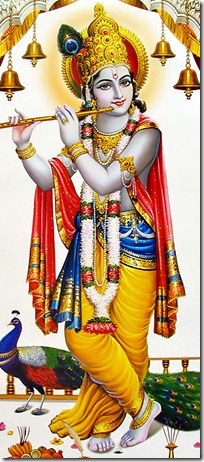 The conditioned soul is deemed lost because his original home is in the spiritual land, where he has God’s direct association. Some may not want to worship Krishna, as they may take Him to be a sectarian figure and not the original form of God. Fear not, however, as the Lord is not so unkind as to insist on worship of only His original form. Indeed, He takes to many other personal expansions, all of which are spiritual in nature and can thus provide liberation, satisfaction and spiritual fulfillment. Lord Rama, the pious prince of Ayodhya, is one such non-different divine form who is kind enough to appear on earth every now and then. Since the name Rama means one who gives transcendental pleasure, anyone who chants it regularly, like GoswamiTulsidas, will forever swim in the ocean of transcendental bliss. Maharishi Valmiki accurately notes that devotees of Rama, those who have turned their back on material life and engaged their tongue solely in chanting Rama’s name and glorifying Him, take tremendous satisfaction in hearing of the Lord’s pastimes. Their hearing of Rama’s glories and pastimes can also be compared to rivers raging into the ocean. While in material life the constant flow of desires is considered detrimental because the ocean representing the satisfaction of the individual never gets filled to the brim, in spiritual life the effect of the same result is reversed. The waves of desire, when taking the form of Rama’s pastimes, also fail to fill up the ocean of spiritual satisfaction in the devotee, but this is a great thing because it means that there is more and more desire to hear of God’s glories. The bhakta, or devotee, never tires of practicing bhakti, as divine love is the original engagement for the soul, something which defines the spiritual spark’s very existence. The conditioned soul is deemed lost because his original home is in the spiritual land, where he has God’s direct association. Some may not want to worship Krishna, as they may take Him to be a sectarian figure and not the original form of God. Fear not, however, as the Lord is not so unkind as to insist on worship of only His original form. Indeed, He takes to many other personal expansions, all of which are spiritual in nature and can thus provide liberation, satisfaction and spiritual fulfillment. Lord Rama, the pious prince of Ayodhya, is one such non-different divine form who is kind enough to appear on earth every now and then. Since the name Rama means one who gives transcendental pleasure, anyone who chants it regularly, like GoswamiTulsidas, will forever swim in the ocean of transcendental bliss. Maharishi Valmiki accurately notes that devotees of Rama, those who have turned their back on material life and engaged their tongue solely in chanting Rama’s name and glorifying Him, take tremendous satisfaction in hearing of the Lord’s pastimes. Their hearing of Rama’s glories and pastimes can also be compared to rivers raging into the ocean. While in material life the constant flow of desires is considered detrimental because the ocean representing the satisfaction of the individual never gets filled to the brim, in spiritual life the effect of the same result is reversed. The waves of desire, when taking the form of Rama’s pastimes, also fail to fill up the ocean of spiritual satisfaction in the devotee, but this is a great thing because it means that there is more and more desire to hear of God’s glories. The bhakta, or devotee, never tires of practicing bhakti, as divine love is the original engagement for the soul, something which defines the spiritual spark’s very existence.The secret in the holy name is that hearing it automatically evokes memories and consciousness of God’s forms, attributes and pastimes. The other aspects of the divine, such as the visible form known as the deity, or saguna manifestation, God’s qualities and His sportive exploits, don’t necessarily evoke sentiments of other aspects when heard or seen. For instance, seeing the deity in the temple doesn’t automatically remind the observer of divine pastimes or the Lord’s name. Those who are unable to understand or accept the path of bhakti but are still interested in learning about the Absolute Truth remain stuck on the nirgunaplatform, where the Lord is viewed as not having a form. Nirguna and saguna are Vedic terms that describe how the conditioned entities, those whose eyes have not yet been properly trained to see the divine influence everywhere, view the Supreme Lord. Nirguna means “without qualities” and saguna means “with qualities”. Regardless of how anyone sees Him, God always remains transcendentally situated and fully formed with spiritual attributes and qualities that are incomprehensible in their magnitude. 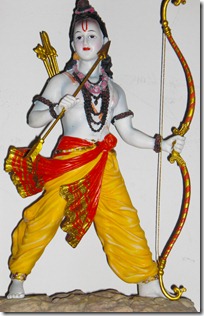 One who cannot understand Krishna’s all-pervading and transcendental nature takes the Absolute Truth to be formless. This mindset, where all that can be understood is nirguna, represents an incomplete realization. Bhaktivinoda Thakura, the exalted Vaishnava acharya, astutely observes that the impersonal feature of the Lord known as Brahman is not an object. Therefore there is no benefit to taking it to be the highest manifestation of the Truth. A person’s ultimate conclusion in life determines their activities, which then shape consciousness. This consciousness then determines the future destination of the soul. If one’s mind is fixed on the impersonal aspect, the perceived nirguna form, the soul merges into the light of Truth that is Brahman at the end of life. Since Brahman is not even an object, as it lacks names, forms, attributes and pastimes, there cannot be any tangible benefit for the merged soul. Upon entering the light of Brahman, identity is immediately lost, and the potential for divine service remains untapped. One who cannot understand Krishna’s all-pervading and transcendental nature takes the Absolute Truth to be formless. This mindset, where all that can be understood is nirguna, represents an incomplete realization. Bhaktivinoda Thakura, the exalted Vaishnava acharya, astutely observes that the impersonal feature of the Lord known as Brahman is not an object. Therefore there is no benefit to taking it to be the highest manifestation of the Truth. A person’s ultimate conclusion in life determines their activities, which then shape consciousness. This consciousness then determines the future destination of the soul. If one’s mind is fixed on the impersonal aspect, the perceived nirguna form, the soul merges into the light of Truth that is Brahman at the end of life. Since Brahman is not even an object, as it lacks names, forms, attributes and pastimes, there cannot be any tangible benefit for the merged soul. Upon entering the light of Brahman, identity is immediately lost, and the potential for divine service remains untapped.By the same token, taking the saguna form - which is the deity or the vision of the incarnation, or avatara – as the highest understanding also shows some immaturity in thought. Saguna worship is definitely superior to nirguna understanding, because one who thinks that the Lord is formless essentially takes man to be no different than God, as the spirit soul is also without a material form. This narrow viewpoint can then lead to the nadir of material existence, the lowest point, the most detrimental mindset of “I am God”. Saguna worship at least has some benefits to it in that the spiritual attributes and personal nature of the Lord are understood. Yet one who only worships saguna without understanding higher truths might be mistaken to believe that God only exists in His specific worshiped form or that He only resides in the temple. Indeed, as one who is antaryami, or the all-pervading witness, God’s influence is everywhere. The Supersoul, the expansion of the Supreme Spirit residing within the heart, validates this fact. The Supreme Lord is everywhere, and His personal influence is not limited to His deity form or the vigrahasof His various personal expansions, including that of His original form. The holy name is the gateway to freedom, the lamp decorated with jewels that lights the devotee up from both within and without. Since the holy name is a direct incarnation, it pervades all aspects of material life. The name allows the bhakta to remember and worship God without any restriction or limitation. Time, space and outside influences cannot ever stop the devotee from their dedication to bhakti-yoga, or devotional service. At the very least, even if one finds themselves in a very distressful situation, the name of the Lord is there to shield them from pain and suffering. Indeed, great devotees like Prahlada Maharaja and Draupadi, who found themselves in dire circumstances on a few occasions, simply remembered the holy name and were saved from all calamity. 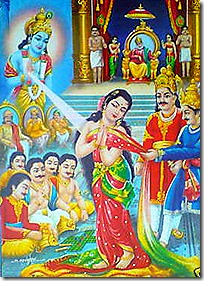 Just as the burning lamp outside the home hints at the warmth and friendliness of the residents, the devotee who keeps the jewel lamp of Rama’s name on their tongue will shine their transcendental qualities onto others. When we see pictures of ShriHanuman chanting Rama’s name, he is always happy. As his whole body is beaming with transcendental love, he becomes a true object of worship, a person whose association brings alleviation from the most acute pain and suffering experienced in this world; hence one of Hanuman’s names is Sankat Mochan. Hanumanji was very influential on Tulsidas, as he provided the saint counsel and spiritual strength. Tulsidas is a direct representative of Hanuman, so the prescriptions he provides are flawless in every way. Just as the burning lamp outside the home hints at the warmth and friendliness of the residents, the devotee who keeps the jewel lamp of Rama’s name on their tongue will shine their transcendental qualities onto others. When we see pictures of ShriHanuman chanting Rama’s name, he is always happy. As his whole body is beaming with transcendental love, he becomes a true object of worship, a person whose association brings alleviation from the most acute pain and suffering experienced in this world; hence one of Hanuman’s names is Sankat Mochan. Hanumanji was very influential on Tulsidas, as he provided the saint counsel and spiritual strength. Tulsidas is a direct representative of Hanuman, so the prescriptions he provides are flawless in every way.By not chanting God’s name on a regular basis, both the inside and outside of the body remain in darkness. On the inside, the natural knowledge of the soul remains covered up by a wall of nescience. As a result, there is hesitancy at every step, with second guessing and constant worry over what course of action should be taken. On the outside, the internal ignorance shows when the individual becomes protective of their own interests and takes others to be enemies. When lacking a spiritually situated consciousness, the human being is no different than the animal. Not all animals are venomous or predatory, but due to their ignorance, the animal kingdom is unable to think beyond the basic necessities of the body, which include eating, sleeping, mating and defending. The true advantage of the human form of life is the higher potential for gathering the spiritual variety of intelligence, which can bring about the highest gain. 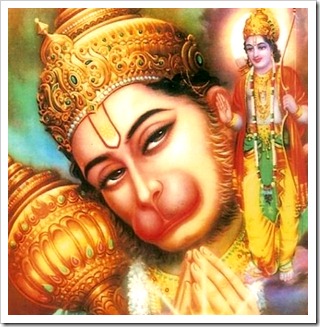 When the inside of the body is lit up with love and devotion for God, one’s consciousness becomes purified. From this illumination come constitutional activities, the collection of which makes up the discipline of devotional service. One who takes to bhakti as their way of life automatically becomes the greatest welfare worker, the shelter for those needing it. The Vaishnava acharyas all recommend this process of chanting the holy name, and instead of wondering what all the fuss is about, if we actually heed their kind advice, we too can beam with transcendental wisdom and emotional satisfaction at all times of the day. Lord Chaitanya, the celebrated incarnation of Krishna appearing on earth some five hundred years ago, established the tradition of chanting the maha-mantra, “Hare Krishna Hare Krishna, Krishna Krishna, Hare Hare, Hare Rama Hare Rama, Rama Rama, Hare Hare”, at least sixteen rounds a day on a set of japa beads. Even if we take to this chanting routine begrudgingly, simply applying a little force to the mind, convincing it of the worthiness of the process, the benefits will still come. The names of Rama and Krishna are ever powerful, as they represent the only jewel lamps that never require fuel and can never burn out. Anyone who holds on to this light and keeps it by the doorway of the mouth will have all auspiciousness and be the reservoir of spiritual energy for anyone who kindly approaches them. When the inside of the body is lit up with love and devotion for God, one’s consciousness becomes purified. From this illumination come constitutional activities, the collection of which makes up the discipline of devotional service. One who takes to bhakti as their way of life automatically becomes the greatest welfare worker, the shelter for those needing it. The Vaishnava acharyas all recommend this process of chanting the holy name, and instead of wondering what all the fuss is about, if we actually heed their kind advice, we too can beam with transcendental wisdom and emotional satisfaction at all times of the day. Lord Chaitanya, the celebrated incarnation of Krishna appearing on earth some five hundred years ago, established the tradition of chanting the maha-mantra, “Hare Krishna Hare Krishna, Krishna Krishna, Hare Hare, Hare Rama Hare Rama, Rama Rama, Hare Hare”, at least sixteen rounds a day on a set of japa beads. Even if we take to this chanting routine begrudgingly, simply applying a little force to the mind, convincing it of the worthiness of the process, the benefits will still come. The names of Rama and Krishna are ever powerful, as they represent the only jewel lamps that never require fuel and can never burn out. Anyone who holds on to this light and keeps it by the doorway of the mouth will have all auspiciousness and be the reservoir of spiritual energy for anyone who kindly approaches them. |
Search This Blog
Tuesday, June 7, 2011
Keep the Home Fires Burning
Subscribe to:
Post Comments (Atom)
No comments:
Post a Comment